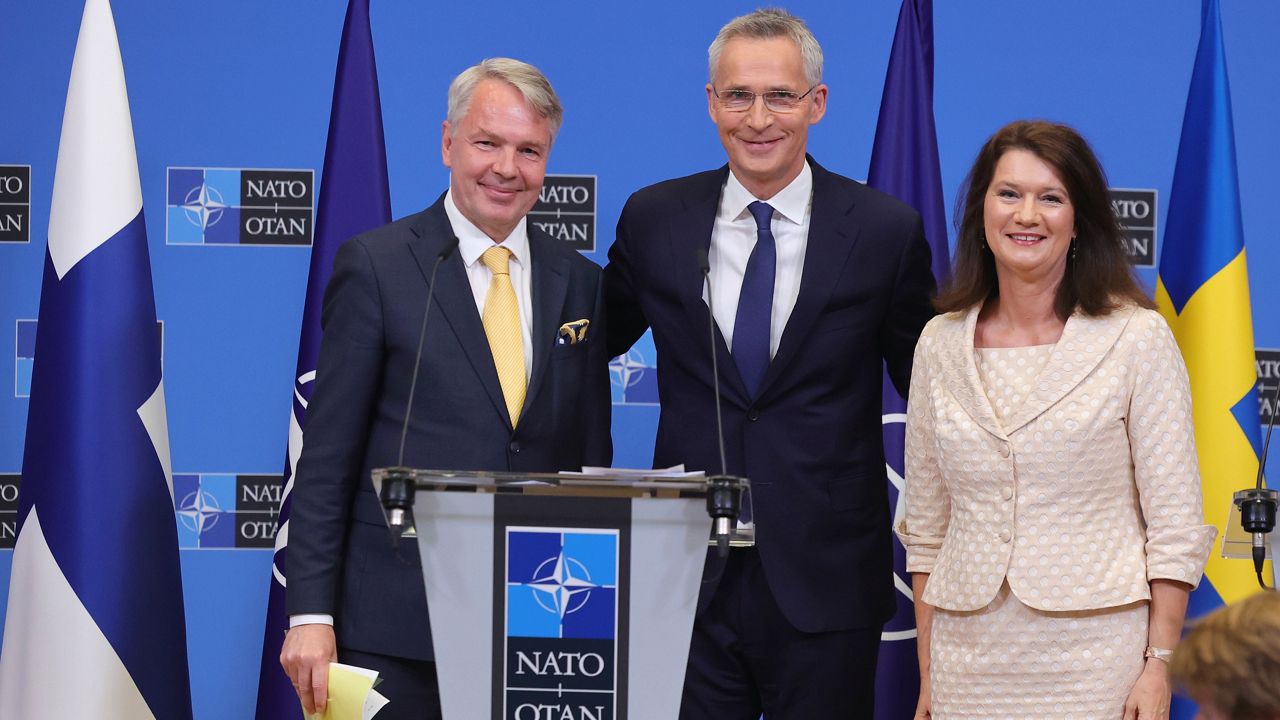The Senate on Wednesday is expected to vote on ratifying the accession of Finland and Sweden to NATO, Senate Majority Chuck Schumer, D-N.Y., said on Tuesday, a move that would bolster the alliance’s ranks in the face of Russia’s aggression in Ukraine.
"Our NATO alliance is the bedrock that has guaranteed democracy in the Western world since the end of World War II," Schumer said on the Senate floor Tuesday. "This strengthens NATO even further and is particularly needed in light of recent Russian aggression.”
The two previously neutral Nordic states changed their stance on joining the alliance after neighboring Russia began its invasion of Ukraine earlier this year. Each member country must approve the accession of new members — Turkey initially raised concerns about the two countries’ membership, but ultimately relented.
Schumer added that he and Minority Leader Mitch McConnell, R-Ky., had committed to the country’s leaders that the Senate would approve the ratification resolution “as fast as we could” to bolster the alliance "in light of recent Russian aggression."
The measure would require the support of at least two-thirds of the Senate before President Joe Biden can submit it to the alliance, a figure the chamber is likely to easily reach.
"The vote this afternoon will be as decisive as it is bipartisan," McConnell said on the Senate floor Wednesday. "If any Senator is looking for a defensible excuse to vote ‘no,’ I wish them good luck. This is a slam dunk for nationall security that deserves unanimous bipartisan support.”
Last week, Sen. Jim Risch, R-Idaho, the ranking member of the Senate Foreign Relations Committee, urged his fellow lawmakers to approve their membership to NATO without delay, praising their “strong and capable militaries” and strategic importance to the Baltic states.
“One only has to look at a map to see the benefits of adding Finland and Sweden to NATO. With their proximity to the Baltic states – which are small – they are well positioned to provide support, if needed, to our current Baltic NATO allies,” Risch said. “Just as the rest of NATO would if the Baltic states have a problem with Russia. Adding these two nations as full members to our alliance will further deter any temptation by Russia to engage in military adventurism in the Baltic or Arctic regions.”
“There should be no issue with moving this treaty as quickly as possible,” Risch added. “The Senate’s quick ratification of Finland and Sweden as new members of NATO will both send a strong message of transatlantic unity to a now floundering Russia, and strengthen NATO against Russia’s growing threat.”
But at least one lawmaker — Sen. Josh Hawley of Missouri — has indicated that he will not back the measure, saying that it’s more important to counter the growing threat from China instead of investing in bolstering European security commitments.
“America’s greatest foreign adversary doesn’t loom over Europe,” Hawley wrote in an op-ed for National Interest. "It looms in Asia. I am talking of course about the People’s Republic of China.”
“And when it comes to Chinese imperialism, the American people should know the truth: the United States is not ready to resist it,” he continued. "Expanding American security commitments in Europe now would only make that problem worse—and America, less safe.”
In an interview with Spectrum News on Wednesday, Hawley doubled down on his point and expanded on why he will oppose the measure.
"My view is that we can either focus on China, who was our number one foreign adversary, our number one foreign threat, or we can send more troops and more resources and make more commitments in Europe, but I don't think we can do both," Hawley told Spectrum News' Angi Gonzalez. "And my view is we should be focusing on China, so I'm gonna vote no on expanding NATO, because that would mean more U.S. troops in Europe for the long haul."
"It would be for us spending in Europe for the long haul, it would be more resources, more firepower in Europe, when I think we desperately need those things in Asia to counter China," he continued, adding: "For those reasons, I'll be voting no on NATO expansion.
The chamber will consider two amendments before the final vote.
One from Sen. Rand Paul, R-Ky., would ensure that NATO’s guarantee to defend its members does not supersede the authority of Congress in authorizing the use of military force and declaring war.
The other, from Sen. Dan Sullivan, R-Alaska, would declare that all NATO members should spend a minimum of 2% of their gross domestic product on defense. Funding for NATO sparked as a top concern during the Trump era, including among some Republicans, but those issues have slid from prominence in the face of Russia’s war in Ukraine.
Sullivan’s amendment would also mandate that NATO countries devote 20% of their defense budgets to “major equipment, including research and development.”
The Associated Press contributed to this report.



